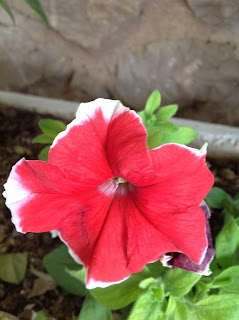Translate
Δευτέρα 30 Μαΐου 2016
Κυριακή 22 Μαΐου 2016
Σάββατο 21 Μαΐου 2016
Κυριακή 15 Μαΐου 2016
Flowers
"In the trembling grey of a spring dawn, when the birds were whispering in mysterious cadence among the trees, have you not felt that they were talking to their mates about the flowers? Surely with mankind the appreciation of flowers must have been coeval with the poetry of love. Where better than in a flower, sweet in its unconsciousness, fragrant because of its silence, can we image the unfolding of a virgin soul? The primeval man in offering the first garland to his maiden therby transcended the brute. He became human in this rising above the crude necessities of nature. He entered the realm of art when he perceived the subtle use of the useless."
"Much may be said in favor of him who cultivates plants. The man of the pot is far more humane than he of the scissors. We watch with delight his concern about water and sunshine, his feuds with parasites, his horror of frosts, his anxiety when the buds come slowly, his rapture when the leaves attain their lustre. In the East the art of floriculture is a very ancient one, and the loves of a poet and his favorite plant have often been recorded in story and song. With the development of ceramics during the Tang and Sung dynasties we hear of wonderful receptacles made to hold plants, not pots, but jewelled palaces. A special attendant was detailed to wait upon each flower and to wash its leaves with soft brushes made of rabbit hair. It has been written in "Pingtse", by Yuenchunlang, that the peony should be bathed by a handsome maiden in full costume, that a winter-plum should be watered by a pale, slender monk. In Japan, one of the most popular of the No-dances, the Hachinoki, composed during the Ashikaga period, is based upon the story of an impoverished knight, who, on a freezing night, in lack of fuel for a fire, cuts his cherished plants in order to entertain a wandering friar. The friar is in reality no other than Hojo-Toki-yori, the Haroun-Al-Raschid of our tales, and the sacrifice is not without its reward. This opera never fails to draw tears from a Tokio audience even today."
Kakuzo Okakura, The Book of Tea
Πέμπτη 12 Μαΐου 2016
"Ημερολόγιο προσευχής"
"Κύριε, δεν μπορώ να Σε αγαπήσω όπως θέλω. Είσαι μια λεπτή ημισέληνος που ατενίζω κι ο εαυτός μου είναι η σκιά της Γης που με εμποδίζει να δω ολόκληρο το φεγγάρι. Η ημισέληνος είναι πολύ όμορφη κι ίσως κάποια σαν κι εμένα να μην πρέπει ή να μην μπορεί να δει παρά μονάχα αυτή* όμως φοβάμαι, Κύριε, ότι η σκιά του εαυτού μου θα μεγαλώσει τόσο που θα σκεπάσει εντελώς το φεγγάρι, κι ότι θα κρίνω τον εαυτό μου από τη σκιά που είναι το τίποτα."
"Δεν Σε γνωρίζω, Κύριε, γιατί εγώ η ίδια είμαι το εμπόδιο. Σε παρακαλώ, βοήθησέ με να παραμερίσω τον εαυτό μου."
"Αν γνώριζα πλήρως τον εαυτό μου, Κύριε, αν μπορούσα να ανακαλύψω όσα μέσα μου είναι σχολαστικά και εγωκεντρικά, όσα είναι με οποιονδήποτε τρόπο ανειλικρινή, τότε τι θα γινόμουν; Αλλά πώς θα διαχειριζόμουν τα συναισθήματα που γίνονται πότε φόβος και πότε χαρά και βρίσκονται τόσο βαθιά εντός μου, που δεν μπορεί να τα συλλάβει ο νους μου; Φοβάμαι τα ύπουλα χέρια, Κύριε, που ψαχουλεύουν στο σκοτάδι της ψυχής μου. Σε παρακαλώ, προστάτεψέ με. Σε παρακαλώ, γίνε το πέπλο στην είσοδο του περάσματος. Κρατώ την πίστη μου από οκνηρία, Κύριε; Αυτή η ιδέα, ωστόσο, θα άρεσε σε κάποιον που μόνο να σκέφτεται μπορεί."
Φλάννερυ Ο' Κόννορ, "Ημερολόγιο προσευχής", Μετάφραση: Γιάννης Παλαβός, αντίποδες, 2015, σ. 17, 18, 23.
Παρασκευή 6 Μαΐου 2016
"internally a sage; externally a king"
"Confucianism comes about as an attempt to reconstruct social order and to restore wide-reaching peace. Advocated by Confucius and his followers, the theory is that if the ruler could set a good example to his people in his personal behavior and in his family relationships, and if the people could be morally transformed to preserve good personal conduct and to maintain good family relations, then all societal problems, large ans small, would dissolve. This theory sounds overly simplified and optimistic, but it is based on a sophisticated social philosophy. Confucian society is founded on family units. Social order begins with family order".
"This Confucian project of social reform begins from the top - from the ruling class. Confucius and his followers spent the major part of their adult lives traveling from one nation-state to another, in the hope of convincing the kings to embrace their ideals. The ideal ruler for the Confucians is someone who has perfect virtue (one who obtains sagehood) internally. His internal virtue would then manifest itself externally as the best rulership. The motto representing the Confucian political view is "internally a sage; externally a king."
Από το καταπληκτικό βιβλίο:
JeeLoo Liu, "An Introduction to Chinese Philosophy. From Ancient Philosophy to Chinese Buddhism", Blackwell Publishing, 2006, p. 16, 17.
Εγγραφή σε:
Σχόλια (Atom)















